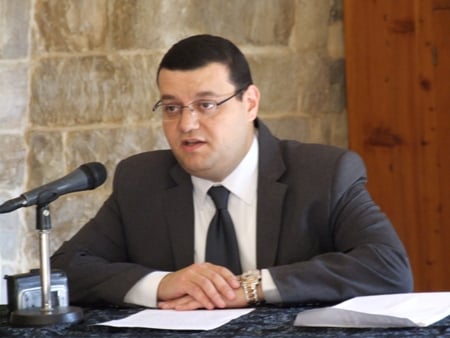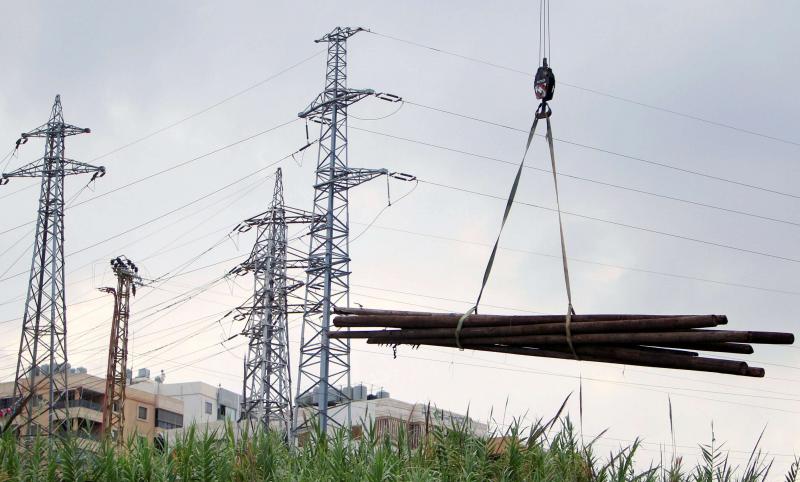Lebanon’s electricity problem: More obstacles on the road
Rami Rayess / The Arab Weekly
8 مايو 2018

Lebanon’s power sector serves as one of the most flagrant examples of the consecutive cabinets’ failures to locate and implement solutions. It has cost the Lebanese government an estimated $2 billion, yet the country lacks 24/7 power supply. As summer approaches, more pressure is expected on the network, with increasing demand and less supply.
Besides the frustration that the failure has produced at the popular level, proposed plans are criticised by a cross-section of political parties and energy experts. Lebanese Minister of Water and Power Cesar Abi Khalil has insisted that the only solution available is leasing gigantic power-generating ships instead of constructing new power plants.
The deal, refused by the Central Inspection Board for its lack of transparency, was refuted by two big political parties represented in the cabinet, the Lebanese Forces and the Progressive Socialist Party (PSP).
The latter prepared a comprehensive study about the sector and its rehabilitation projects and presented it to the cabinet. It considered that “any attempt to resolve this crisis must commence through drastic reform steps in the electricity institution and the sector as a whole. Investment in the sector without reform is futile and will lead to additional squandering of funds.”
The party proposed several steps, beginning with appointing a new board of directors for Electricite du Liban (EDL). Jobs need to be filled as 50% of the positions in the electricity sector are vacant. There has been little monitoring of contracts the board implements and numerous other administrative problems.

“The possibility of creating two new electrical power plants with the capacity of 500 megawatts each is possible and can be put into service in June 2020,” said power expert Mounir Yehia, who participated in drafting the PSP plan.
It called for “expanding the spread and adoption of alternative (renewable) energy and its distribution to the Lebanese consumer through the exchange of energy with the network and good billing based on modern systems instead of the current Net Metering and customs exemption of imported equipment for this purpose.”
In electricity, an initial reduction of 50% of losses in 2018 through the commitment to address technical and non-technical losses and the implementation of administrative reforms are essential to revive the electricity sector. Commitment to achieve financial balance by the beginning of 2020 by reducing the total electrical losses (technical and non-technical) from the high level (50%) to no more than 12% must be an attainable goal, the PSP plan stated.
The issue of electricity and waste has led much of the Lebanese public to consider the entire political community as competing parties incapable of running the country’s affairs. Protesters took to the street in large numbers a couple of years ago to induce change.
Little has happened since. Various NGOs that emerged out of popular protests turned into contending and competing groups themselves, repeating the examples of the parties they accused of being incapable of resolving accumulating problems. Many ran to the parliamentary elections in a bid for change and reform.
With parliamentary elections paving the way for a new political phase, electricity will remain a hot topic for the new cabinet.
 عن أمل جنبلاط المتجدد: لبنان يستحق النضال
عن أمل جنبلاط المتجدد: لبنان يستحق النضال
 صحافيون أم عرّافون!
صحافيون أم عرّافون!
 ماذا يجري داخل أروقة بيت الكتائب المركزي؟
ماذا يجري داخل أروقة بيت الكتائب المركزي؟


 عن الخرائط التي تُرسم والإتفاقات التي تتساقط!
عن الخرائط التي تُرسم والإتفاقات التي تتساقط!
 “الإنحراف في الحياة”/ بقلم كمال جنبلاط
“الإنحراف في الحياة”/ بقلم كمال جنبلاط
 هاشتاغ #صار_الوقت يحل أولاً في حلقة جنبلاط
هاشتاغ #صار_الوقت يحل أولاً في حلقة جنبلاط
 طاولة نقاش عن أزمة الصحافة في جامعة AUST
طاولة نقاش عن أزمة الصحافة في جامعة AUST
 عبدالله: ليظهر لنا وزير مكافحة الفساد حرصه في صفقات البواخر والفيول
عبدالله: ليظهر لنا وزير مكافحة الفساد حرصه في صفقات البواخر والفيول
 عبدالله: غريب أمر وزارة مكافحة الفساد!
عبدالله: غريب أمر وزارة مكافحة الفساد!

 Comment to Uri Avnery: How Sad What Is Looming Ahead
Comment to Uri Avnery: How Sad What Is Looming Ahead
 “Not Enough!”
“Not Enough!”
 … لمن لم يقرأ يوسف البعيني/ بقلم وسام شيّا
… لمن لم يقرأ يوسف البعيني/ بقلم وسام شيّا
 كمال جنبلاط في مولده الأول بعد المائة: تعاليمه وأفكاره ما زالت الحلّ/بقلم عزيز المتني
كمال جنبلاط في مولده الأول بعد المائة: تعاليمه وأفكاره ما زالت الحلّ/بقلم عزيز المتني
 رئيس حزب/ وليس (… سابقاً)/ بقلم د. خليل احمد خليل
رئيس حزب/ وليس (… سابقاً)/ بقلم د. خليل احمد خليل
 التوازن السياسي في لبنان
التوازن السياسي في لبنان
 لبنان… مشاريع انقلابية مؤجلة
لبنان… مشاريع انقلابية مؤجلة
 جنبلاط وحَمَلة أختام الكاوتشوك
جنبلاط وحَمَلة أختام الكاوتشوك
 Le Liban est un symbole de tolérance
Le Liban est un symbole de tolérance
 Our Automated Future
Our Automated Future
 The True Origins of ISIS
The True Origins of ISIS
 Les Misérables vs. Macron
Les Misérables vs. Macron
 عذراً أيها المعلم/ بقلم مهج شعبان
عذراً أيها المعلم/ بقلم مهج شعبان
 رساله الى المعلم / بقلم ابو عاصم
رساله الى المعلم / بقلم ابو عاصم
 إلى روح القائد والمعلم كمال جنبلاط/ بقلم أنور الدبيسي
إلى روح القائد والمعلم كمال جنبلاط/ بقلم أنور الدبيسي
 أسرار وعناوين الصحف ليوم الجمعة 14 كانون الاول 2018
أسرار وعناوين الصحف ليوم الجمعة 14 كانون الاول 2018














